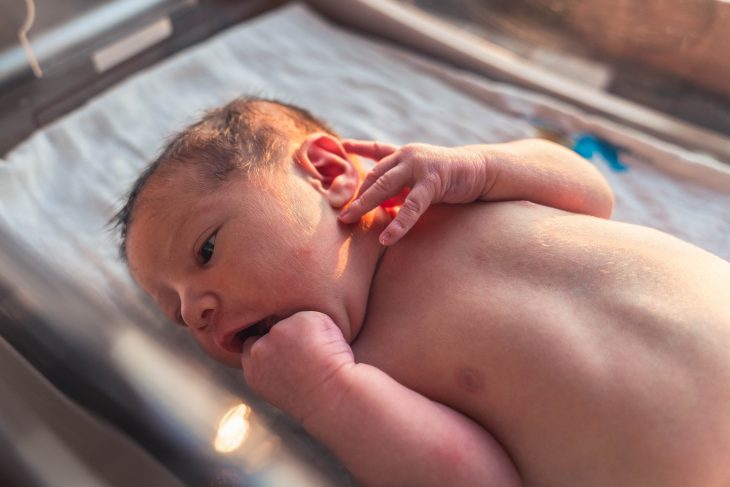Is your formula-fed baby suddenly refusing the bottle? We know how frustrating this can be, and we are here to help! Babies refuse bottles for many reasons, and not all of those reasons are easy to detect. In this article, we will examine some of the most common reasons that babies refuse bottles as well as what you should – and shouldn’t – do about it.
Why Is My Baby Refusing Bottle All of a Sudden?
Baby Suddenly Refusing Bottle
Formula-fed babies can sometimes refuse to take their bottle, and oftentimes, this happens out of nowhere. So, why do babies refuse to take their bottle?
Several reasons could be the culprit:
- Gassiness: If your baby is screaming, pulling his or her legs up, is arching their back, or is burping excessively, he or she may be suffering from gas. Gas can be very painful for a baby and can occur both during and after feeding.
- It’s the Bottle: Some bottles are better than others, and when it comes to your baby, he or she will often let you know which they like best. If you need a new bottle you can check out 7 Best Baby Bottles for Wind or you can research other bottles types that target specific problems you may notice with your baby.
- Nipple Flow Is Too Fast: The younger the baby is, the slower the flow of the nipple should be. Ensure that you are using the correct nipple for your baby’s age, as this will affect how fast they suck and can ensure that the feeding process stays comfortable for them.
- The Milk Is Too Hot (Or Too Cold): Though some parents often wonder “does cold formula cause gas?“, the truth is that some babies really love a cold bottle of milk and it never causes them gas at all! However, if your baby does not like cold milk, it could be the reason he or she is crying. To warm it, purchase a bottle warmer, or warm it gently over the stove at low heat. Once warmed, always ensure that the milk isn’t too hot by testing it on your wrist. Remember that microwaving your baby’s bottle is dangerous because it can cause hot pockets in your baby’s bottle which can potentially scorch your baby’s mouth.
- Something’s Off With the Milk: Outside of being too hot or too cold, comes the possibility that there’s something “off” with your baby’s milk. It could be that the milk is sour, has a funny taste, or has something wrong with it. Keep in mind that heavily scented dish soaps and foods from the refrigerator can sometimes permeate baby milk causing it to taste funny. When this happens, your baby may begin to reject the milk.
- It’s Something Else: Sometimes it isn’t the milk that is causing the refusal as much as it is external factors. Maybe your baby isn’t in a comfortable position, has an earache, is feeling sick, has an injury, or needs his or her diaper changed. Consider these things and investigate when your formula-fed baby suddenly refuses the bottle.
- He or She Is (Very) Tired: It sounds funny, but there is such a thing as a baby becoming “overtired“. This term usually refers to the baby who is so tired that he or she has difficulty winding down. Unfortunately, this can manifest in feeding habits too. Sometimes the baby will seem like they want to feed but won’t actually feed because what they desperately need is sleep. If your baby is constantly fighting the bottle close to naptime, consider allowing the nap first and attempting to feed again afterward.
- There’s an Underlying Health Condition: Lactose intolerance, tongue tie or lip tie can all affect feeding habits in formula-fed babies. Talk to your pediatrician about your concerns if your baby continues to refuse the bottle when you are trying to feed them.
- Not Hungry: That’s right! It could be that your baby simply isn’t hungry. If you fed your baby not too long ago, chances are that he or she is still full. Give it some time before attempting to feed your little one again. He or she may surprise you and gladly accept their bottle later on!
Formula Fed Baby Suddenly Refusing Bottle 2 Months
At two months old, your baby could be refusing the bottle because he or she is having one of the issues mentioned above. Or perhaps it’s because he or she simply prefers the breast. This, of course, only pertains to babies who are breastfed. But it is worth noting that attempting to switch a baby from the breast to a bottle at two months may be difficult. Because the baby is used to the shape, texture, and smell of the mom’s breast, a bottle with a plastic nipple can be very difficult for some babies at two months old to accept.
Baby Suddenly Refusing Bottle 3 Months
At three months, your baby is bright-eyed, bushy-tailed, and completely enthralled with the world around them! As such, you may notice that your baby is more interested in their environment than taking a bottle. If your baby is too distracted to feed, consider taking him or her to a dark room away from people, pets, and windows to ensure that he or she gets proper nutrition.
Baby Suddenly Refusing Bottle 4 Months
Believe it or not, teething can start as early as three months. Because the pain and swelling associated with emerging teeth can be overwhelming for babies, it is possible that it can affect eating habits, and yes, cause them to refuse the bottle. Grab a soothing teething toy or a gum massager (LINK) to help relieve this type of pain for your infant.
Baby Suddenly Refusing Bottle 6 Months
Around six months of age, you may begin introducing solids to your baby. Just make sure that you are giving your baby table foods only after your baby’s scheduled bottle feedings and not before. Otherwise, the solid food may interfere with your baby’s milk schedule.
9 Month Old Refusing Bottle
A nine-month-old baby may refuse the bottle due to the aforementioned reasons or due to underlying causes such as an ear infection. You may try offering the milk in a sippy cup instead to see if this helps clear up the issue. Otherwise, check with a doctor or nurse practitioner to get tailored advice about what steps should be taken next.
Formula Fed Baby Suddenly Refusing Bottle 10 Months
Remember, there are many reasons a baby may refuse to take a bottle. At 10 months, your baby may be refusing his or her bottle to show their independence, or they may be refusing the bottle because of teething pain. If the problem persists, get in contact with your pediatrician to get to the bottom of your baby’s refusal to take his or her bottle.
Can a Baby Suddenly Stop Liking Formula
Baby Refusing Formula
Your baby may be refusing formula for various reasons that may not be clear to you. If you’ve been giving your baby the same formula for a while and suddenly he or she rejects it, you will want to look deeply into the situation to figure out why.
At times, babies who have been feeding normally may begin shunning the bottle because of a negative experience they’ve had. Or sometimes, the reason that the baby isn’t taking the bottle is unknown. This phenomenon is often referred to as “feeding aversion”. In severe cases, babies that have a feeding aversion may end up in the hospital. If the aversion goes on for more than a few days, you’ll want to see your pediatrician immediately.

Is Baby Refusing Bottle a Phase?
Baby refusing a bottle can be a phase, but not always. It will depend on why your baby is refusing the bottle in the first place. For this reason, you must narrow down the reasons your baby is exhibiting this behavior so that you can remediate the issue.
To help with this process, consider taking notes about your baby’s behavior so that you can begin to identify patterns. What to track includes what times your baby feeds, how you were positioning the baby at the time of the feed, what happened right before the feed, your baby’s behavior afterward, when his or her last nap was, whether or not his or her diaper was dirty at the time of the feed, and more. By recording this information, you may be surprised at the patterns you uncover!

Why Do Babies Stop Drinking Formula?
Baby Won’t Drink Formula
Your baby may refuse formula for differing reasons. If the formula is too hot, too cold, has a weird flavor, if the bottle has a defect, or if they are full from their last meal, then your baby may temporarily stop drinking.
On the flip side, if your baby seems to be refusing formula long-term and the reasons for the change aren’t clear, you’ll want to reach out to your doctor to get the best advice, especially if you notice your child beginning to lose weight.
Why Do Babies Go on Milk Strike?
A “milk strike” is a term that was created by parents to refer to the phase that babies often go through in which they refuse to eat. Babies often go on milk strikes for the many reasons we’ve already mentioned in this post.
In addition to the aforementioned reasons for milk strike, remember that your baby is young. They cannot express his or her feelings the way that we can as adults. If there has been a recent dramatic change in your life or if your baby is undergoing something unfamiliar (surgery, going to daycare, being weaned from the breast) then your baby may respond to these circumstances by going on a “milk strike”.
How Long Do Bottle Strikes Last?
Bottle strikes usually last anywhere from 2-4 days with some strikes even topping out at 10 days. If you begin to notice your baby losing weight, growing more ill, having a fever, diarrhea, or pulling at their ears, you should contact your doctor immediately.
When to worry about your baby’s refusal to take the bottle includes:
- Pulling at ears
- Crying Constantly
- Fever Present
- Losing Weight
- Showing Signs of Illness
- Has Diarrhea

Baby Fights Bottle But Hungry
Should I Force My Baby to Drink Milk?
Whatever you do, don’t force your baby to drink milk. This may cause your baby to become averted to feeding from their bottle for good. You will be making the feeding experience negative by forcing your baby to eat. Thus, you will more likely make your baby continue resisting the feed rather than making things better. Instead, wait an hour or two, look for hunger cues, and try again.
As always, reach out to your healthcare provider when you have serious concerns.

Overcoming Bottle Refusal
We understand that experiencing a bottle strike can be stressful and scary. The next time your baby refuses to take his or her bottle, try the following:
- Feed in a Boring Room: this will eliminate distractions for your baby.
- Switch Out the Nipple (and Bottle If Needed): See if your baby takes the bottle any easier after the change.
- Switch Up the Positioning: Your baby may be uncomfortable with the way he is she is positioned while feeding, especially as they grow bigger. Adjust your baby to see if this helps.
- Watch the Temperature: Keep your baby’s milk warm but not hot when feeding to help your baby.
- Don’t Force It: Remember, forcing your baby to drink their milk when they don’t want to may do more harm than good.
- See a Pediatrician: Sometimes a baby refuses a bottle for reasons that only a doctor can detect. If your baby’s bottle strike goes on for longer than a few days, see your doctor for information on how to move forward.
Baby Suddenly Refusing Bottle? Keep an Eye On It…
If your baby is refusing his or her bottle, you’ll want to keep an eye on it. Make sure to take notes surrounding the feeds including your baby’s behavior, and how long it has been between feeds. Take the information to your pediatrician to get tailored advice on the next steps to take.



Leave a Reply